#minaf
Explore tagged Tumblr posts
Text
OH MY FREAKING GOD IT IS BIRTHDAY PRESENT TIME!!!!!!!

just posted a new fic!!!
https://archiveofourown.org/works/63248695
summary:
The year is 1990, and Richie Tozier is going through a metric fuckton. He's fourteen years old, which like, wow, what a fucking nightmare by itself. His sleep schedule is next to nonexistent, and he feels like he walks around looking like that vampire in that one old movie. (Nose-fur-a-tutu? No-spur-a-doo? Whatever.) Neither of these things, however, can even hold a candle to the absolute anguish that is being in love with your best friend, particularly when you could never in a million years actually confess. But on top of all of that pain and suffering, now he's experiencing something completely novel and uncharted:experiencing emotions. Fuuuck. How is he gonna survive this?
Y'all, I'm so proud of this fic!!! I wrote it as a birthday present for the bestie @gaylittlerichie < 3 < 3 < 3
Featuring Richie Tozier sobbing over a boy, and just in general suffering and going through trials and tribulations vis-a-vis being a teenage boy.
#TUCK IN MY DEAR ITUALS. TONIGHT WE DINE ON MINAFIC FEAST AND DANCE ALL OUR TROUBLES AWAY#never had a fic written for me b4 im getting so excited that I projectile vomit like a cat.#Minaaaa I love UUUUU 😖😖🧡🥰☝️#And it’s called boys don’t cry. We won’t be moving on from this. Ever I don’t think#fic rec#reddie
35 notes
·
View notes
Text

stefenezik tir minaf & his faithful companion (embassy drawpile today)
23 notes
·
View notes
Text
Filme: "Soberba" (1942), Orson Welles
No crepúsculo do século XIX, a família Amberson é o centro gravitacional de sua cidade, uma dinastia americana cuja mansão imponente e riqueza parecem tão permanentes quanto as estrelas. A sua saga, contudo, é a crônica de uma queda, catalisada pelo seu próprio herdeiro, o jovem e insuportavelmente arrogante George Amberson Minafer. Ao regressar da faculdade, George encontra a sua mãe viúva,…

View On WordPress
0 notes
Photo

[대한민국민화아트페어 2022 사전등록 무료관람 안내] - 민화의 다양한 면모를 볼 수 있는 국내 유일 민화 아트페어 🎉 * 사전등록기간 : 6/3~6/20 * 대한민국 민화아트페어 홈페이지 -> "온라인 사전등록" - * 전시 일정 및 장소 2022.6.23(목)-6.26(일) 서울무역전시장(SETEC 1관) 학여울역 1번 출구 서울 강남구 남부순환로 3104 SETEC - * 문의사항 월간민화 : 02-765-3812 한국민화협회 사무국 : 02-720-1988 - 많은 관심 부탁드립니다. ^^ 한국민화협회 제27회 회원전은 무료관람 가능합니다. 오셔서 함께 관람해주세요~ - 민화의모든것 #대한민국민화아트페어 #kminaf #2022 - #민화 #minhwa #Korea #한국 #대한민국 #민화아트페어 #minaf #한국민화협회 #folkart #folkpainting #전통 #문화 #미술 #예술 #daily #일상 #행복 #소통 #art #축제 #행사 #illust #학여울 #무료관람 #사전등록 Reposted from @koreaminhwa(SETEC 세텍에서) https://www.instagram.com/p/Ce4vvkxPo83/?igshid=NGJjMDIxMWI=
#대한민국민화아트페어#kminaf#2022#민화#minhwa#korea#한국#대한민국#민화아트페어#minaf#한국민화협회#folkart#folkpainting#전통#문화#미술#예술#daily#일상#행복#소통#art#축제#행사#illust#학여울#무료관람#사전등록
0 notes
Text









Agnes Moorehead as Fanny Minafer in The Magnificent Ambersons (1942)
#agnes moorehead#the magnificent ambersons#fanny minafer#orson welles#1940s#b&w film#myedit#mygifs#stgedit
4 notes
·
View notes
Text
WHAT’S YOUR MUSE’S 19TH CENTURY TROPE?
randomize your results here | inspired by this | REPOST ONLY!!
Romantic Maiden Aunt who is Prone to Conniptions
tagged by: @acadiian
tagging: @zeldaphionaspellman @aspirinqpoetess @inkapacitated @bullshyit
3 notes
·
View notes
Text
شركة فرنسية تتحدى "قيصر" وتساهم بشركة سورية! - مرصد العربي برس
العالم – سوريا ونشر المحلل الاقتصادي السوري كرم الشعار، وثيقة رسمية مصدقة من وزارة التجارة الداخلية وحماية المستهلك تؤكد دخول شركة Minaf SEA الفرنسية مؤخرا، في مشروع مشترك (سعودي- سوري- هولندي) كبير للبناء، وهو شركة أسمنت البادية. وبحسب الشعار فإن الشركة تأسست عام 2006، برأس مال قدره 1.97 مليار ليرة سورية (أي ما يعادل 200 … https://s.alarabi.press/aUmTw
0 notes
Photo

Tim Holt in The Magnificent Ambersons (Orson Welles, 1942)
Cast: Joseph Cotten, Dolores Costello, Anne Baxter, Tim Holt, Agnes Moorehead, Ray Collins, Erskine Sanford, Richard Bennett, Orson Welles (voice). Screenplay: Orson Welles. Cinematography: Stanley Cortez. Production design: Albert S. D’Agostino. Film editing: Robert Wise. Music: Bernard Herrmann.
So much has been written about the mishandling and mutilation of Orson Welles's second feature film that it's hard to see The Magnificent Ambersons that we have without pining for the one we lost. What we have is a fine family melodrama with a truncated and sentimental happy ending and an undeveloped and poorly integrated commentary on the effects of industrialization on turn-of-the-20th-century America. We also have some of the best examples of Welles's genius at integrating performances, production design, and cinematography -- all of which Welles supervised to the point of micromanagement. The interior of the Amberson mansion is one of the great sets in Hollywood film. Welles used the set as a grand stage, exploiting the three levels of the central staircase memorably with the help of Stanley Cortez's deep-focus camerawork. Welles later told Peter Bogdanovich that Frank Lloyd Wright, who was Anne Baxter's grandfather, visited the set and hated it: It was precisely the kind of domestic architecture that he had spent his career trying to eliminate, which, as Welles said, was "the whole point" of the design. As for the performances, Agnes Moorehead is superb as the spinster aunt, Fanny Minafer, especially in the "kitchen scene," a single long take in which her nephew, George (Tim Holt), scarfs down strawberry shortcake as she worms out of him the information that Eugene Morgan (Joseph Cotten) has renewed his courting of George's widowed mother, Isabel (Dolores Costello). The news is especially painful for Fanny, who had hopes of attracting Eugene herself. Holt, an underrated actor, holds his own here and elsewhere -- he is, after all, the central character, the spoiled child whose selfishness ruins the chances for happiness of so many of the film's characters. We can mourn the loss of Welles's cinematic flourishes that were apparently cut from the film, but to my mind the chief loss is the effective integration of the theme initiated when Eugene, who has made his fortune developing the automobile, admits that the industrial progress it represents "may be a step backward in civilization" and that automobiles are "going to alter war and they're going to alter peace." Welles was speaking from his own life, as Patrick McGilligan observes in his book Young Orson. Welles's father, Dick Welles, had been involved in developing automobile headlights -- the very thing in which Fanny invests and loses her inheritance -- and was the proud driver of the first automobile on the streets of Kenosha, Wisconsin, Welles's home town. The Magnificent Ambersons would have been much richer if Welles had been able to make the statement about the automobile that he later told Bogdanovich was central to his concept of the film.
2 notes
·
View notes
Link
“The studio-edited curtailments of Welles’ intended narrative appear as crude as an ‘Itchy and Scratchy’ title card reading ‘George Amberson Minafer died on the way back to his home planet’ [...]”
Where else can you get this caliber of film criticism?
#Orson Welles#Don Quixote de Orson Welles#Don Quixote#Mr. Arkadin#Gregory Arkadin#The Other Side of the Wind#Peter Bogdanovich#Journey into Fear#Joseph Cotten#The Immortal Story#Karen Blixen#Isak Dinesen#The Trial#Franz Kafka#Josef K.#Macbeth#Scottish Play#Othello#Filming Othello#The Stranger#The Lady from Shanghai#Rita Hayworth#Touch of Evil#Hank Quinlan#The Magnificent Ambersons#George Amberson Minafer#Chimes at Midnight#Falstaff#Sir John Falstaff#F For Fake
2 notes
·
View notes
Text
i love this so much and ily
warmth
for my wife
mina ashido x fem!reader
rating: 15+
Keep reading
14 notes
·
View notes
Text
Soberba (1942)
The Magnificent Ambersons
Direção: Orson Welles; Fred Fleck e Robert Wise (diretores não-creditados das sequências adicionais);
Roteiro: Orson Welles; Joseph Cotten e Jack Moss (roteiristas não-creditados das sequências adicionais); baseado no romance homônimo de Booth Tarkington;
Gênero: Drama; Romance;
País: EUA.
A mutilação que os produtores incidiram sobre este projeto pessoal e relativamente autobiográfico de Orson Welles constitui-se como uma das maiores tragédias cinematográficas de todos os tempos. Afastado da direção, os momentos finais da narrativa estiveram nas mãos de Fred Fleck e Robert Wise, que modificaram deliberadamente o roteiro original de Welles: isso justifica a inexpressividade do elenco próximo do encerramento do filme e o encaminhando para o final feliz destoante do conjunto da narrativa anteriormente desenvolvida. Ainda assim, Soberba consiste num potente drama familiar que expõe suas forças tanto no pretexto superficial, quanto nas camadas mais profundas de sentido.
Nos anos finais do século XIX, Isabel Amberson (Dolores Costello), detentora do mais importante sobrenome da cidade, esteve noiva do proeminente, porém boêmio, empresário Eugene Morgan (Joseph Cotten). Ela, no entanto, casara-se com Wilbur Minafer (Don Dillaway), com quem teve apenas um filho: o arrogante e orgulhoso George Minafer (Tim Holt). Passados quase vinte anos, Isabel e Eugene, ambos viúvos, encontram-se novamente. Embora os tempos sejam outros e as convenções sociais já não sejam as mesmas, George opõe-se terminantemente à amizade ou romance entre Eugene e sua mãe, em defesa da honra e do símbolo de poder erigido em torno do sobrenome Amberson.
Tendo como pano de fundo este drama familiar sobre a trajetória que acompanha o esplendor e a decadência dos Ambersons, uma aristocrática família de Indianápolis, a narrativa do filme versa sobre as mudanças sociais promovidas pela passagem do tempo e pelos aprimoramentos tecnológicos: através das relações sociais entre as duas famílias - Ambersons e Morgans - o principal embate em questão é a substituição do esplendor aristocrático pela burguesia insurgente. A passagem do tempo e as transformações sociais encontram-se metaforizadas na narrativa pela invenção do automóvel: neste sentido, a discussão entre George e Eugene sobre as consequências de uma fábrica de automotivos durante um juntar na mansão dos Ambersons é extremamente significativa. Ironicamente, próximo final do filme, quando encontrava-se já destituído das benesses do sobrenome, George é atropelado por um automóvel, como se a narrativa do filme materializasse o solapamento da aristocracia pela burguesia.
Soberba mostra-se também como um excelente ensaio técnico de Orson Welles. A sugestão de perspectivas ópticas é extremamente significativa: a imponência que George acredita possuir é, o tempo todo, materializada pela maneira como a câmera enquadra o personagem. Outra cena exemplar sobre a impecabilidade técnica de Welles é a do baile de recepção de George, quando a câmera “baila” entre os casais dançantes, pescando aqui e ali trechos de diálogos constituintes da narrativa.
⭐ 4.1 / 5.0
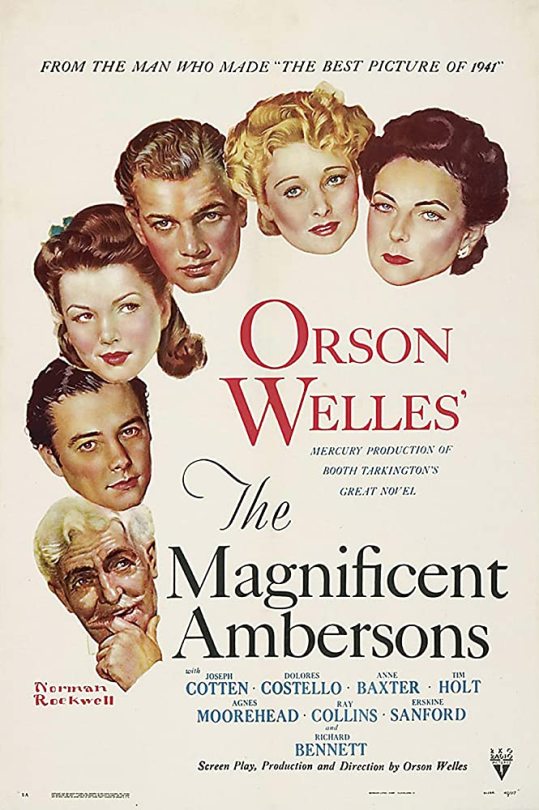
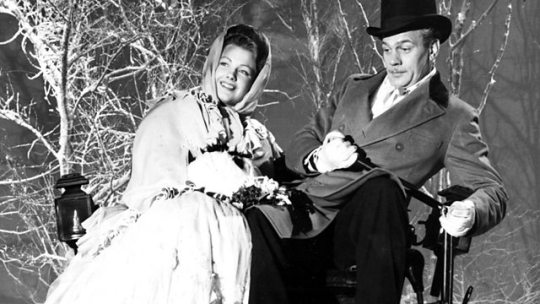
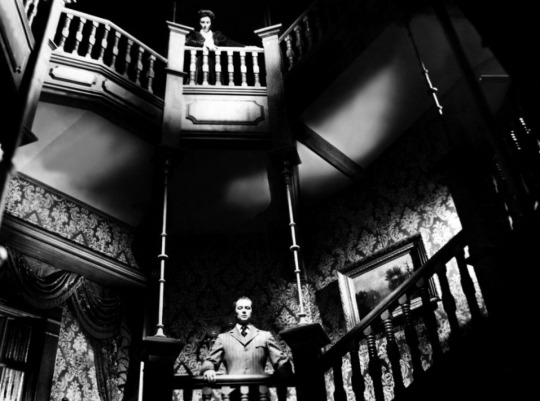
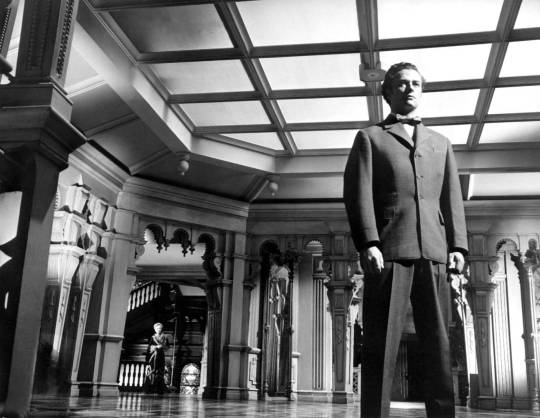
#Filme#Movie#Drama#Romance#Drama Movie#Romance Movie#Soberba#The Magnificent Ambersons#Orson Welles#Fred Fleck#Robert Wise#Joseph Cotten#Dolores Costello#Anne Baxter#Tim Holt#Agnes Moorehead#Ray Collins#Erskine Sanford#Richard Bennett
2 notes
·
View notes
Text
twice users
- badhirais
- hiraipeace
- sanaghost
- ittsnayeon
- jeongmosz
- lustdahyun
- michaengzs
- hopetzuyu
- minafancys
- fancydahmo
- cchaeyoungz
- michaengzs
- wishingjihyo
• like or reblog if you save, please
(c) @clrkemilia
#twice users#kpop users#twitter users#minatozaki sana users#sana users#sana#mina twice users#mina users#minatwice#hirai momo users#hirai momo#jeongyeon users#jeongmo#jeongmo users#jeongyeon#nayeon users#jihyo users#jihyo#chou tzuyu#tzuyu users#chaeyoung users#chaeyoung#dahyun#dahyun users#dahmo#dahmo users#michaeng users#michaeng
57 notes
·
View notes
Text









Agnes Moorehead as Fanny Minafer in The Magnificent Ambersons (1942)
12 notes
·
View notes
Text
fairytale aesthetics
Bold for what applies totally to your muse, italic for what applies in some circumstances/some verses (or for what applies but your muse wouldn’t like to admit it). Repost!
Tagged By: @patiencetaught Tagging: @multamusa @rugcut @zeldaphionaspellman
THE SNOW QUEEN brand new snow boots. the boy next door. windowsill flowers. skating on the pond. the beauty of a snowflake. a sharp pain in your eye. a broken mirror. frosted windows. a sudden difference in a loved one. ice-cold lips upon your forehead. a pale hand against the glass. frozen flowers. the depths of midwinter. offering a sacrifice. deep, cold water. a flower garden. an unexplainable feeling of something being missing. dreaming of love. soft silk. summer air. desperate escape from a castle. a friendly raven. autumn leaves falling all around you. a knife pressed against your cheek. running for your life as time runs out. northern lights gleaming overhead. an impossible puzzle to decipher. winter passing, to become spring. seeing the world through whole new eyes . SNOW WHITE desperately longing for a child. a drop of blood in the snow. a heartfelt wish. loss of a mother at a very young age. uncertainty and foreboding at a grand occasion. sweet singing echoing around castle walls. white doves. a terrible enemy in the guise of a friend or family member. hair as black as ebony. skin as white as snow. lips as red as blood. a practitioner of darker magic. bitter vanity. an arrow in the dark. the heart of a deer. running terrified into a dark forest. depending on the kindness of strangers. a magic mirror. an apple fallen from a pale hand. a slumber like death. a glass coffin in the middle of a wood. all the king’s horses, all the king’s men. true love’s first kiss. the sense of contentment that comes with justice having been served to a terrible person. CINDERELLA a blessed childhood. a kindly heart. little mice in the walls. bluebirds. sweet and pleasant dreaming. a lifetime of scorn from your own family. being treated like a servant.invitation to a fabulous ball. barely daring to be excited. a gown ripped to shreds. crying in the courtyard.white horses. a lizard in the grass. coach and footmen. glass slippers. eyes meeting across a crowded room. the first dance with the one you love. your heart feeling like it is bursting with joy. walking arm in arm with a beloved one. a wonderful evening. the first blossom of love. the stroke of midnight. a desperate rush to be home. a secret underneath a loose floorboard. smashed glass, hopes shattered. the happiness that comes with finally having been seen for whom you truly are. THE LITTLE MERMAID the shimmering ocean floor. brilliant blooming coral. fish with bright and shiny scales. the figurehead of a ship. sea-spray striking your face. the wind rustling in your hair on the top deck. a violent and vigorous thunderstorm. heart pounding with mingled terror and excitement. strange ripples on the water’s surface. love at first sight. a desperate bargain struck. your legs trembling as you try to walk. a terrible ache in your feet like blades with every step you take. the softness of the sand. an unrequited longing. the heartbreak that comes with seeing the one you love walking arm in arm with another. a blade held tightly in your hand. a kiss pressed to your sleeping lover’s forehead. loving another more than you love yourself. unbearable suffering. sea-foam drifting on the surface of the ocean. SLEEPING BEAUTY the aching disappointment from not being invited to a social function. an anger as deep as the forest. a terrible and malicious act against a wholly innocent person. believing wholeheartedly in fairies. singing softly in a cottage garden. the feeling that there is more to your life than has yet been revealed to you. the excitement of a birthday approaching. spinning wheels covered by cobwebs. a spinner’s needle, bright and sharp. the inexplicable urge to touch what you should not. a pinprick and a drop of blood. nature growing to consume all signs of human habitation. a crumbling ruin filled with roses. a nightmare that you cannot wake up from. the terrible knowledge that everything you ever knew and loved has been irreparably lost as time moved on around you. RAPUNZEL a desperate craving for something which cannot be satisfied by anything else. being caught in the act of doing something criminal. making a bargain for the sake of another person’s welfare. a tall stone tower in the center of a forest. sweet singing from a window far above you. gently running a brush through your long hair. an unexpected visitor in the middle of the night.the bittersweet joy that comes with experiencing tenderness that you have never known before. cruel eyes watching from the shadows. pleading for another’s life.breaking the rules in order to prevent something terrible from happening, even though you’re frightened. finding someone beloved and long thought lost, and holding them tightly. your hand clasped tightly in the hand of another. knowing that you’re safe at last, as long as you’re together.
#'the terrible knowledge that everything you ever knew and loved has been irreparably lost as time moved on around you'#thats literally the theme of ambersons#;the old maid (fanny minafer)
2 notes
·
View notes
Text
The Magnificent Ambersons (1942)
This is a broken film which was supposed to be the amazing follow-up to Orson Welles’ Citizen Kane. People who saw the rough version of 2½ hours thought it was a much better film than Citizen Kane in every way possibles with the final scene being a sad but incredible moment in movie-making history, and a scene which Mr Welles never equalled in his career. That version will never be seen. This post is as uneven as the film, but I can’t blame Studio Executives for that.
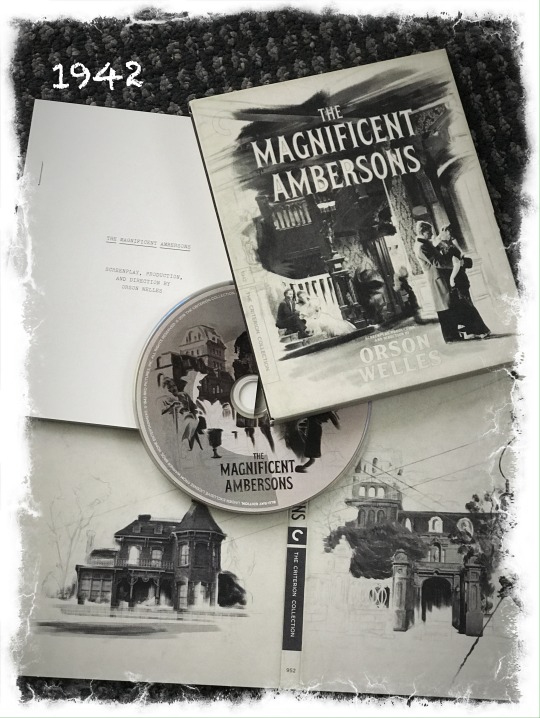
Brilliant. Simply brilliant.
George Minafer (played by Tim Holt) is a first class shit head of an asshole. He treats everyone so badly I’m surprised he came back from College with all of his limbs.
Eugene: [0:42:00] I'm not sure George is wrong about automobiles. With all their speed forward they may be a step backward in civilization. May be that they won't add to the beauty of the world or the life of the men's souls, I'm not sure. But automobiles have come and almost all outwards things will be different because of what they bring. They're going to alter war and they're going to alter peace. And I think men's minds are going to be changed in subtle ways because of automobiles. And it may be that George is right. May be that in ten to twenty years from now that if we can see the inward change in men by that time, I shouldn't be able to defend the gasoline engine but agree with George - that automobiles had no business to be invented.
Set in the very earliest of days of the horseless carriage’s development, this is so very prescient.
After 30 minutes of film setting the circumstances of the world in place, we arrive at George’s Life Changing Event: the death of his father, Wilbur Minafer, who we’ve only heard speak two sentences, I believe (he had more, but they were cut, much to the consternation of a thus-uncredited Don Dillaway, probably).
Right around the sixty minute mark, however, things get pretty compressed. Isabel Amberson Minafer and George are off to travel the world and never return, go to Paris, then Isabel’s health fails, they do return to town, and then she dies. All in about 10 minutes. That’s a lot of material in so little screen time, and most of it is delivered by people who explain what they saw happen, not us actually seeing it ourselves.
There are a couple of huge jumps in the time-line which are each covered with about 10 seconds of film and perhaps 20 words of dialogue. Stuff like ‘gosh, isn’t it sad that Billy fell down the well?’ are fine to set up an episode of Lassie, but when you use something akin to that in order to replace five years or more of character development, the viewer certainly feels cheated. Well, I did, anyway.
Then, at 1:22:00, we see George praying at his mother’s bed, and the VO says he has his comeuppance. Right there, at 1:23:30, this should be the end.
George Minafer gets hit by an automobile — the infernal thing he said he despised. He now has no income to support his Aunt at all.
And — Goddamn — the final scene is the purplest thing you’ve ever seen.
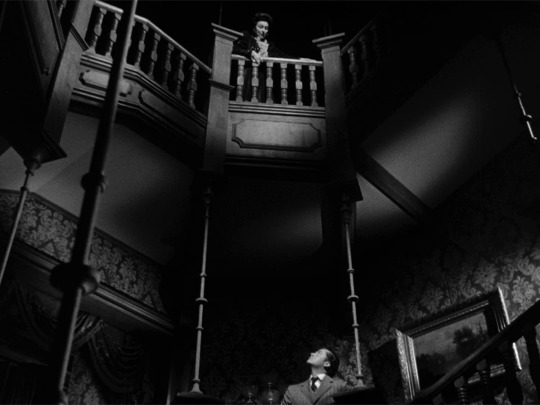
Agnes Moorehead [above] and Tim Holt [below] in The Magnificent Ambersons (1942) — — — —
See, originally, the thing was a good 50 minutes longer, but Mr Welles left the film in the hands of his editor, Robert Wise, while he zoomed off to the next project, shooting his ⅔ of a portmanteau documentary film in Brazil called It’s All True, which was to be his 3rd film as stipulated in his contract for RKO. When the studio looked at The Magnificent Ambersons in its rough working length of 50% more than they bargained for, they told Mr Wise to get cutting. So, Mr Wise consulted with Mr Welles just before he left the country, making those few cuts he knew about. The deal was that the studio would pack a Moviola (a film viewer thing used for editing purposes that looks like part of one of the old ‘watch a movie inside a wooden box!’ things at penny arcades and so on), a working print of the film in its extant form, and some editing people, onto a ship or an æroplane to Mr Welles in Brazil. That didn’t happen, because by this point the US had entered WWII and it was nearly impossible for either Mr Wise or an editing assistant (a ‘cutter,’ in cinema parlance) to fly to Mr Welles, or vice versa, owing to travel rationing. A telephone line was set up specifically to aid in consulting with the director (this was 80 years ago, after all), but the story goes that the studio supervisor told to liaise with Mr Welles avoided answering the phone when it rang, specifically to avoid the input, plus a series of written communiques were crumpled up and thrown away without even being read. So, Mr Wise, in consultation with the studio as well as star Joseph Cotten, were forced to start guessing as to how to proceed. He cut a bunch of stuff, then shot some quick coverage to paper over the gaps in the story. The end result is that Mr Welles didn’t speak to Mr Wise for decades, was angry at his long-time friend Mr Cotton for a bit, and this episode probably cemented in the director his life-long distrust of Studio Big-Wigs as nothing but a bunch of meddling bean counters who wouldn’t know a good movie if they got their dicks caught in the sprocket holes of it.
I like to think that last sentence would have made him laugh.
The performances of everyone are incredible. Tim Holt shows that he’s not just the western star which he was known as at the time; he’s capable of nuanced and sophisticated characters as well. Agnes Moorehead, as Geiorge’s Aunt Fanny Minafer, is an example of how an actor can make bold, large choices and be entirely believable in a film setting; her ‘mad scene’ is riveting. This film really is the story of these two characters, and how they cope with a changing landscape of financial challenge and circumstances. =Had the film not been gutted, we would have been able to see more of them, and that is the greatest loss to my mind.
On its original release, the film was shown on at least one occasion as a second feature on a double bill with Mexican Spitfire Sees a Ghost (1942). The second feature. Brother!
Sadly, a reconstruction of the film as it was intended isn’t possible in the way other films of his have been — eg: Touch of Evil — because the footage excised was either destroyed or thrown away.
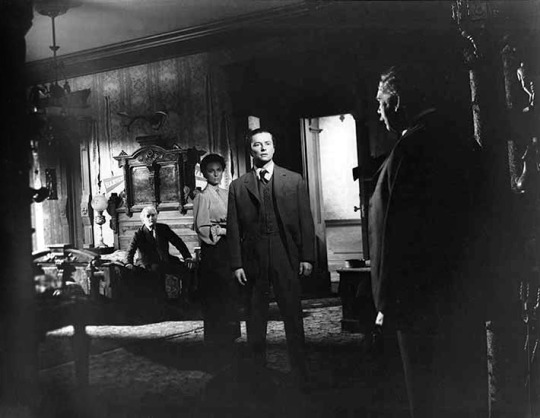
[left to right] Richard Bennett, Agnes Moorehead, Tim Holt, and Ray Collins in The Magnificent Ambersons (1942) — — — —
To add insult to injury, the Brazilian ‘good will’ documentary aimed at welcoming the South American neighbour into the arms of the US & Allied forces, It’s All True, was never completed: only about ⅓ of its footage survived (probably 200,000ft of Technicolor® nitrate was tossed into the Pacific in the 1960s or ‘70s, and there was much more than that originally), and the stuff that has survived was mostly repurposed in the DesiLu Productions stock film library. So there’s two films in a row that didn’t happen correctly, the second of which didn’t happen at all. There’s a documentary about It’s All True available and it’s worth your attention, as the last ⅓ or so is a reconstruction of the story of 4 guys who sailed on a raft thousands of kilometres to lobby the Brazilian government for basic rights to be extended to people in the outer reaches of the country. It’s only got some sound effects and music, but unlike ‘silent films,’ there are no inter-titles for dialogue. Mr Welles essentially invented a whole new filmmaking technique.
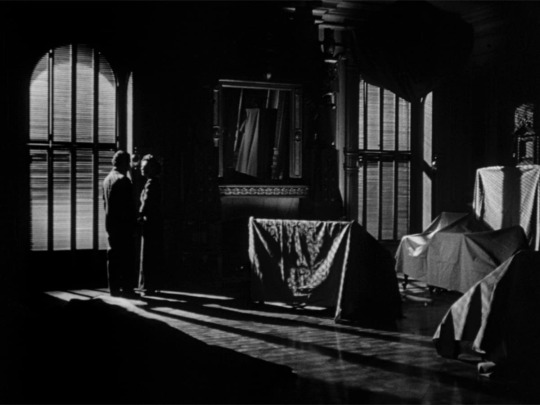
[left to right] Tim Holt and Agnes Moorehead in The Magnificent Ambersons (1942) — — — —
The films of Mr Welles are basically a list of ‘things which didn’t get made at all,’ punctuated by ‘things which weren’t finished’ and ‘things which others messed around with.’ Thankfully there’s a few works which he made and have his vision properly realized. Those are cherished.
Watching the first hour of this film is the last sort… and then it becomes someone else’s picture. Alas.
★★★★☆
1 note
·
View note